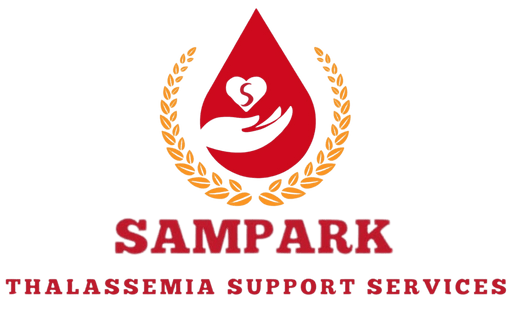What is Thalassemia:
Thalassemia is an inherited (i.e., passed from parents to children through genes) blood disorder caused when the
body doesn’t make enough of a protein called hemoglobin, an important part of red blood cells. When there isn’t
enough hemoglobin, the body’s red blood cells don’t function properly and they last shorter periods of time, so
there are fewer healthy red blood cells traveling in the bloodstream.
Red blood cells carry oxygen to all the cells of the body. Oxygen is a sort of food that cells use to function. When
there are not enough healthy red blood cells, there is also not enough oxygen delivered to all the other cells of the
body, which may cause a person to feel tired, weak or short of breath. This is a condition called anemia. People
with thalassemia may have mild or severe anemia. Severe anemia can damage organs and lead to death.
Thalassemia Symptoms:
Since your body has fewer red blood cells when you have thalassemia, you may have symptoms of a low blood
count, or anemia. When you have anemia, you might feel tired or weak. You might also experience Dizziness.
- Shortness of breath
- A fast heart beat
- Headache
- Leg cramps
- Difficulty concentrating
- Pale skin
People with moderate and severe forms of thalassemia usually find out about their condition in childhood, since
they have symptoms of severe anemia early in life. People with less severe forms of thalassemia may only find out
because they are having symptoms of anemia, or maybe because a doctor finds anemia on a routine blood test or
a test done for another reason.
Thalassemia Complications:
Your body will try very hard to make more red blood cells. The main place where blood cells are made is the bone
marrow, the dark spongy part in the middle of bones. Because your bone marrow may be working harder than
normal, it might grow bigger. This causes your bones to expand, and may stretch your bones and make them
thinner and more easily broken.Another place where blood is made is an organ called the spleen. It sits on the left
side of your abdomen, just under your lower ribs. The spleen has many other jobs. Two of the major ones are
filtering the blood and monitoring the blood for certain infections. When it finds these infections, it can start the
process of fighting them. When you have thalassemia, the spleen can get very big as it tries to make blood cells.
Because it is working so hard on this job, it can’t work as hard to filter blood or monitor for and fight infections.
Because of this, people with thalassemia are said to be “immunocompromised,” which means that some of the
body’s defenses against infection aren’t working. When you are immunocompromised, it is easier for you to get
infections and you sometimes need extra protection, like flu shots and other vaccines.
Thalassemia Prevention:
Because thalassemia is passed from parents to children, it is very hard to prevent. However, if you or your partner
knows of family members with thalassemia, or if you both have family members from places in the world where
thalassemia is common, you can speak to a genetic counselor to determine what your risk would be of passing
thalassemia to your children.
